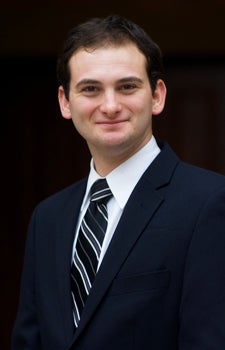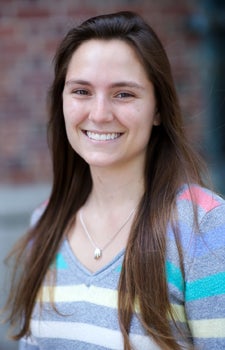Head of the Class
Katherine Fu: The Brain of the Matter
It’s said that the study of the human brain is the last frontier in science. With that in mind, Katherine Fu, the class of 2013 valedictorian, is ready to chart new territory.
“The brain is so fascinating,” said Fu, who is majoring in neuroscience and biological sciences at USC Dornsife. “It plays a role in everything, from controlling essential activities, like our heart rate and breathing, to contributing to our different personalities — how we react to things, how we think about things and how, as humans, we’re at once very similar, but we also exhibit all these individual differences.”
Since the first semester of her freshman year at USC, Fu has worked as an undergraduate research assistant at the Brain and Creativity Institute, housed in USC Dornsife, where she learns the ins and outs of functional magnetic resonance imaging techniques. For her senior honors thesis, the USC Trustee Scholar researched how functional neural network activity is related to individual differences in experiencing empathy.
“That’s what’s great about USC,” Fu said. “There are so many opportunities. Within the first few months of expressing an interest in working in a lab, I found myself working as an undergraduate research assistant. It’s amazing.”
Classically trained in both the piano and viola, Fu also pursued her love of music with a minor in popular music studies at the USC Thornton School of Music. And she lent her viola skills to Remedy Through Music, a student-run group that provides music therapy to hospitals and convalescent homes around Los Angeles.

Katherine Fu photo by Dietmar Quistorf.
“It’s a great opportunity to combine my love of music with what I’d like out of my future profession, which is to improve the quality of life of patients,” said Fu, who begins medical school this Fall.
Fu was also a founding member of Interaxon at USC, a student organization that visits local schools to teach students about neuroscience, and the Premedical Chapter of the USC Asian Pacific American Medical Student Association. As part of the latter group, she helped organize health fairs and screenings to serve the city’s Asian community.
Despite her packed schedule, Fu has made time for another, less academic pursuit: Chinese martial arts. She began her training in middle school in Irvine, Calif., and received her black belt in Shaolin kung fu two summers ago. Her time with Wushu Nation, a student group on campus, is “a great stress reliever,” she said.
While Fu is still deciding which medical school to attend, the recipient of the Emma Josephine Bradley Bovard Award for academic excellence knows neuroscience will always be a passion. She also received the Neuroscience Outstanding Student of the Year Award for undergraduates.
For now, she’s considering academic medicine, which would allow her to pursue teaching and mentoring, along with research and clinical work.
“It provides a nice balance that can be shifted as my own interests change or as the health care field changes in the future,” she said. “But I definitely need to do more exploring.” —L.W.
Alexander Fullman: Bound for a Life of Public Service
He has traveled to all seven continents, shaken the hands of three U.S. Supreme Court justices and has had his scholarly research widely published. And he’s not done yet. In the Fall, Alexander Fullman, one of this year’s salutatorians, heads overseas to the University of Oxford. And after that, he said, he has big plans to change the world, advocating for justice and equality.
Yet the Los Angeles native has already made great strides toward that goal.
“I’ve tried to work for justice in my own ways here at USC,” he said, explaining his efforts to spread awareness and advocate against genocides and other mass atrocities in Darfur and the Congo as a University Fellow with the Jewish World Watch organization.
From his first days at USC, Fullman, who is majoring in political science at USC Dornsife with a minor in communication law and media policy from the USC Annenberg School for Communication and Journalism, created a rigorous academic program for himself, preparing for a future in law and public service.
A natural leader, Fullman was also president of the USC Blackstonians Pre-Law Honor Society, vice president of Jewish life at Hillel at USC, and a member of Phi Beta Kappa, the Phi Kappa Phi honor society and the Mortar Board national honor society.
And this year, the USC Trustee Scholar became the eighth USC student to receive a Marshall Scholarship, one of the highest honors awarded to American undergraduates.

Alexander Fullman photo by Dietmar Quistorf.
“I’ve been very fortunate,” said Fullman, who received the University Trustees Award at the Academic Honors Convocation. “From the start of my freshman year and to date, I have found great mentors who encouraged me to pursue the many different opportunities available to undergraduates here at USC.”
Two years ago, one of these mentors, Professor of Political Science and Anthropology Alison Dundes Renteln, urged Fullman to revive the USC Journal of Law and Society, a student-run publication featuring undergraduate legal scholarship.
“It was a little bit nerve-wracking,” he said. “I had never participated in or edited, let alone led, an academic publication before.”
As editor-in-chief, he published two issues: one exploring matters of justice and the other dedicated to election campaigns and political communications. The journal is now in its third year of publication, an admirable legacy for Fullman.
Fullman’s academic prowess twice took him to Washington, D.C., as a Presidential Fellow at the Center for the Study of the Presidency and Congress, where his research focused on Citizens United v. Federal Election Commission, the landmark U.S. Supreme Court campaign finance case. His paper was one of just 20 selected for publication.
After he earns a master of philosophy in comparative government from Oxford, Fullman plans to return to the United States and attend law school, and then focus his career on advocating for people and for the causes in which he believes.
“I’m not sure exactly how that plan will manifest itself, whether as a professor, as an attorney or as a judge,” he said. “Ultimately, I’d like to do something fulfilling as it ties into striving for justice in the world.
“I know that sounds a little idealistic,” Fullman continued, “but I’m allowed to be, right?” —L.W.
Julia Sabo Mangione: Fighting for Justice in All Corners of the World
“If you have come here to help me, you are wasting your time. But if you have come because your liberation is bound up with mine, then let us work together.”
That quote, which is attributed to an aboriginal activist group in Australia, is a favorite of salutatorian Julia Sabo Mangione — and it says a lot about her.
“Human rights has always been a real concern and focus of mine,” said Mangione, who is graduating with a 4.0 GPA in international relations and minors in environmental studies and Spanish from USC Dornsife.
Early on, Steven Lamy, vice dean for academic programs and professor of international relations, became a mentor to Mangione and helped her declare her major.
“I saw international relations as a way to start investigating the question: Why aren’t human rights being upheld — not only in the United States, where they are not upheld at the state we would like them to be, but also internationally — and what kinds of solutions are out there?” she said.
Mangione, who matriculated as a USC Trustee Scholar in the Thematic Option honors program and later earned membership in Phi Beta Kappa, recently received the Emma Josephine Bradley Bovard Award for academic excellence at the Academic Honors Convocation.
As Mangione explored the concepts of human security and global equality in the developing world, took a course in global environmental politics and studied feminist international relations theory, she found that a minor in environmental studies tied in nicely with her major.
“I became really interested in gender studies and how they intersect with climate change,” she explained. “If we empower women and energize their efforts to protect the natural environment, we can actually begin combating climate change on local levels.”
Of course, an international relations major should travel the world, so Mangione spent a semester in Chile, where she completed her minor in Spanish. She also studied in Cambodia and the Arctic through USC Dornsife’s Problems Without Passports, courses that combine problem-based learning research exercises with study abroad.

Julia Sabo Mangione photo by Dietmar Quistorf.
In Cambodia, Mangione conducted research on the country’s genocide and the court that is prosecuting the top Khmer Rouge leaders.
“It was a phenomenal experience as a freshman to get to do all of that,” said Mangione, who emphasized how USC Dornsife’s varied study abroad and research opportunities drew her to the university.
During her Arctic trip to Sweden, Finland and Russia, Mangione studied ecological security and global politics. She learned about a key intergovernmental forum called the Arctic Council, which prides itself on the fact that it includes indigenous people’s organizations, and decided to look into the effectiveness of that participation for her senior honors thesis — for which Mangione received full honors.
While studying human rights internationally, Mangione was also actively involved in advocating for underrepresented students and labor rights both on campus and in the local community.
“You don’t have to go anywhere to engage in the field of social justice,” she said.
Growing up in the San Francisco suburb of Menlo Park, Mangione attended a diverse charter high school, an experience that she said helped her identify the local equality problems in her community as well as connect with the Spanish-speaking Latino community.
At USC, because she “wanted to increase the number of underrepresented minority students in the local community who pursue higher education,” Mangione joined the USC Chicanos for Progressive Education, where she developed curriculum and coordinated a mentoring program for first-generation college students.
She served as president and student-worker relations coordinator of the USC Student Coalition Against Labor Exploitation (SCALE), advocating for better working conditions for employees in the dining halls and dorms. Through her work with SCALE, she also successfully led a two-year campaign to affiliate USC with an independent factory monitor.
“Collaboration between students and administration on this issue led to a policy change that will greatly improve the working conditions of people producing USC apparel,” Mangione said. “We are grateful to President Nikias and other top administrators for their openness to working with us on these issues. This was a real success story.”
Mangione also campaigned with the Unite Here Local 11, the union that represents more than 700 hospitality workers on campus. She looks forward to continuing that kind of work this summer as a part-time employee with the Los Angeles County Federation of Labor.
“I’ll be working locally with immigrant workers to inform them of their rights as well as connect them with the national immigration debate,” she said. “My work in labor at USC has shown me how important it is to address local human security issues as well as global ones.”
Eventually, Mangione hopes to pursue a master’s degree in international development.
“I think coordinating local grassroots efforts globally is what I would like to engage in, exploring how we can energize local community leaders and coordinate that strategy internationally,” she said. “I definitely like the idea of working to pursue social justice on a global scale.” —J.R.